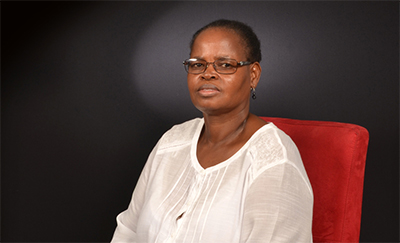College of Human Sciences
Unisa isiNdebele academic wins national library award

The prize giving ceremony was held in Mbombela, in Mpumalanga on 14 August 2018. The event, which the Mpumalanga Department of Culture Sport and Recreation was a collaborating partner, was aligned to the celebration of women’s month under the theme Our pens, Our voices. It also marked the historic centenary of struggle icon Albertina Sisulu.
Malobola-Ndlovu, a former teacher of 28 years, was one of two women awarded for their passion to write in African Languages. She was nominated by her peers who also work to promote writings and readings in isiNdebele.
“I was overwhelmed and happy when I received the award because it is an honour to be recognised by the National Library of South Africa for my contribution to isiNdebele. I believe this will leave a mark in Ndebele history and it will encourage fellow Ndebele writers to join me in preserving our beautiful language together and have a vested interest in knowing more and learn more about our African languages.”
Having also received a 2005 Mtsweni Literary Award; a 2004 Ikhwezi National Language Board Certificate; and a 1992 Kagiso Literary Award, Malobola-Ndlovu says she is very passionate about promoting African languages as most universities will eventually have all their courses in African languages and if these languages are not well developed and promoted, the aim of Africanisation will not be realised.
Malobola-Ndlovu is a holder of three degrees; a BA from Unisa, a BEd and MA from the University of Pretoria and is currently a Unisa doctoral candidate. Since 2013, she has been a lecturer of isiNdebele at Unisa. As one of the fecund authors of isiNdebele, she contributed immensely to preserving, promoting and documenting the language. She is a prolific writer who penned poetry anthologies, short stories, folklore and readers for Grades 1 to 12. As an academic, she had a stint as a part-time lecturer of literature at the University of Pretoria from 1999 to 2013 and she is the internal moderator for Gauteng NATED 550 papers (1999 to date). Related to this, she is also an external moderator for isiNdebele at Mpumalanga University. She is also the founder member of the isiNdebele dictionary Unit and an editor of the bilingual isiNdebele dictionary. She was also a member of the isiNdebele Bible Review Committee of Southern Africa whose works culminated in the launch of the isiNdebele Bible in November 2011.
She adds that “African languages are not for certain groups of people but for all the people who want to take South Africa forward, no matter which space they find themselves in, whether it is finance, journalism, or in the hospitals. South Africa is becoming multilingual country and I wish to motivate the young black people to be passionate about their languages. Come and register at Unisa to study in your language.”
Her advice to the other African language writers: “Literary writing is very imperative because it contains not only the language but the culture, tradition and the values of each language that needs to be preserved. Let us continue to make an impactful contribution and ensure that all African languages are recognised and preserved.”
* By Rivonia Naidu-Hoffmeester
Publish date: 2018/09/10

 Unisa co-hosts G20 community outreach in the Eastern Cape
Unisa co-hosts G20 community outreach in the Eastern Cape
 Unisans gain membership of prestigious science academies
Unisans gain membership of prestigious science academies
 Advocating for disability transformation through servant leadership
Advocating for disability transformation through servant leadership
 Unisa Press continues to illuminate the publishing space
Unisa Press continues to illuminate the publishing space